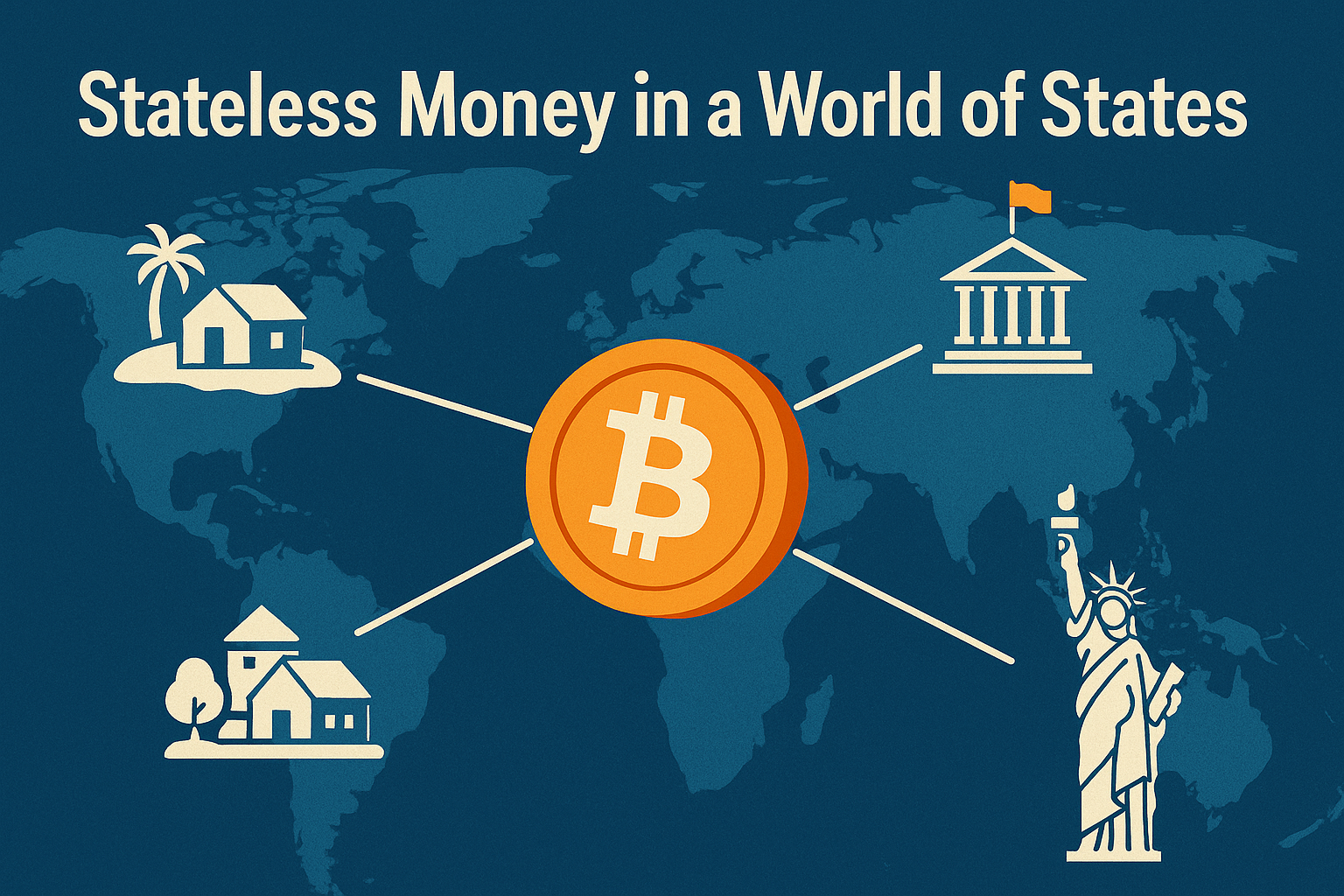🎌 Stateless Money in a World of States
Bitcoin was never designed to integrate neatly into the traditional system. Or rather: the system wasn't designed for sound money. Bitcoin operates independently of state control, is borderless and inflation-resistant by nature. For many, that’s precisely the appeal.
Some Bitcoiners try to live entirely outside conventional jurisdictions — rotating residencies, relying on multisigs, avoiding formal infrastructure. Flag theory, in theory. But in practice, it's not the most comfortable way to live.
People still want community and friendly spaces. A place to build, to raise children, to run their business, to transact openly without fearing that local regulations might turn benign tools into legal liabilities. Despite its statelessness, Bitcoiners still live in a world carved up by jurisdictions.
And so the paradox emerges: Bitcoin is a monetary network, but it resembles a kind of stateless nation, or rather: a network state — with its own economy, values, language, and diaspora. Increasingly, that diaspora is settling into real locations: an Atlantic island, a bar in New York, a beach town in El Salvador, a village in Costa Rice. These aren’t just destinations. They’re early Bitcoin settlements — physical expressions of a digital nation, taking root.
If Bitcoin doesn’t need a state, its users are still bound to some jurisdictions — but they do have a choice. And increasingly, the choice is: build where the rules work for you, or get buried under rules that don’t.
🤗 What Makes a Jurisdiction Bitcoin-Friendly?
The phrase “Bitcoin-friendly” gets thrown around loosely. But what does it actually mean?
It doesn’t mean throwing a conference. It doesn’t mean putting laser eyes on a political figure who tries to get some votes this way. And it certainly doesn’t require sweeping legislative declarations or government-endorsed projects. Often, the most Bitcoin-friendly jurisdictions are the ones that quietly provide the space — and legal clarity — for Bitcoin to work without interference. Often, it’s much simpler than that.
A jurisdiction is Bitcoin-friendly when it respects individual autonomy. When it provides a stable legal environment where property rights are upheld, financial innovation isn’t penalized, and voluntary exchange isn’t presumed criminal.
More concretely, several key traits tend to show up wherever Bitcoiners choose to stay:
- Clear property rights that include digital assets
- Legal neutrality or recognition of Bitcoin contracts, ownership and payments
- Low or zero taxation (which most often is theft) on capital gains and income**
- Streamlined business registration without opaque gatekeepers
- Minimal surveillance infrastructure and reduced KYC overreach
These aren’t exotic demands. They’re baseline requirements for operating in a self-sovereign way. For many Bitcoiners, it’s not about evading the state; it’s about not being obstructed by it.
Bitcoiners want to build. From software protocols to schools and small businesses, the ecosystem thrives when it isn’t under legal threat. That doesn’t require a paradise — just a state willing to tolerate alternatives to super-controlled economy.
And then there’s the human factor: community. Bitcoiners don’t just want favorable tax codes and light-touch regulation. They want to live among people who speak their language — culturally, economically, even morally. A truly Bitcoin-friendly place becomes more so as more aligned individuals move in, reinforcing the environment. In fact, that network of like-minded neighbors might not just be a nice-to-have — it might be the real foundation that makes freedom sustainable.
🏡 The Bitcoin Map: Tracing Bitcoin-Friendly Ground
Bitcoin has no central authority, no borders, and no national flag. But over the past decade, certain places have emerged where Bitcoiners feel more at home — legally, culturally, and economically.
Historically, Switzerland stood out early. In Zug, "Crypto Valley" allowed Bitcoin companies to incorporate, open bank accounts, and operate with minimal friction. That clarity attracted serious builders. It wasn’t perfect — and regulatory tightening followed — but it demonstrated that the right legal environment could foster real innovation.
Other digital-forward states followed: Estonia, Singapore, Liechtenstein. Each offered early promise, but many eventually bowed to pressure from global regulatory bodies. Their flexibility is waning.
Today, being 'Bitcoin-friendly' means more than simply passing a law or hosting a conference. It signals a deeper cultural tolerance for voluntary systems, parallel economies, and non-state money. And while national policy still matters, local behavior, selective enforcement, and grassroots resilience often tell us more about whether a place really works for Bitcoiners. The culture of sovereignty is moving.
There’s a growing number of people identifying as Bitcoiners not just ideologically, but physically. Digital nomadism accelerated this shift. People are relocating based on freedom, not just weather or cost of living.
Some recent standouts:
- Paraguay is gaining traction. Bitcoin mining is cheap, taxes are low, and international capital is flowing in.
- Argentina remains volatile but fiercely pro-Bitcoin at the grassroots. The cultural fit is strong. Milei’s win gave many Bitcoiners hope for a more favorable climate, at least rhetorically. But in practice, most people still rely on stablecoins and altcoins for daily use. Adoption is deep — but fragmented.
- Brazil, Costa Rica, and Guatemala host great organic circular economies run by commied Bitcoiners. These are not policy-led zones — they’re peer-to-peer systems built from the ground up.
In terms of communities:
- Austin has evolved into a bitcoin tech hub. Projects like Pleblab have created a real builder scene. But it still exists inside U.S. regulatory infrastructure.
- Madeira has vocal support through the FREE Madeira initiative. Bitcoin is being welcomed at the political level, though Lisbon still holds the keys.
- Dubai is attractive for business setup and global banking. But it demands trade-offs in transparency and autonomy.
- Pubkey in New York is just a bar, technically. But socially, it might be one of the most important Bitcoin spaces with local events and influence.
And of course, El Salvador. The first and only country to declare Bitcoin legal tender. We saw this as a prototype for nation-state adoption. Some put their hopes and stakes on U.S. establishing a national strategic Bitcoin reserve. But let’s be honest: do we really want the biggest government on Earth, or any government, controlling a massive on-chain stash? It strengthens their hand, not ours — and we might be waiting decades for anything meaningful to grassroot adoption to happen, if it ever does.
El Salvador did more than signal. It built the narrative and took practical steps: Lei Bitcoin, national reserve, volcano bonds, Chivo wallet. But much of it remains underutilized... so to speak. The Bitcoin law was quietly softened under pressure from the IMF. The volcano bonds haven’t launched. Bitcoin City hasn’t broken ground. And while wallets were distributed en masse, usage remains thin beyond the tourist zones.
For all the headlines, El Salvador still functions like any other centralized state — just one that briefly flirted with Bitcoin on paper. But it's still a traditional state — centralized, bureaucratic, and somehow authoritarian.
The future of Bitcoin jurisdictional space may not look like a country. More often, it's a neighborhood, a startup zone, or a building with strong Wi-Fi and stronger principles.
In recent years, Central America has become a kind of proving ground. Legal experiments, community-driven adoption, and warm cultural attitudes toward Bitcoin are converging here. For many Europeans navigating creeping financial surveillance, MiCA overreach, and a cultural climate where privacy is treated as suspicion, the region offers something increasingly rare: breathing room. The EU might be betting on centralized digital identity and CBDCs. Bitcoiners are looking for something else.
That trend isn’t slowing. And it’s setting the stage for a new kind of jurisdictional experiment — not quite a nation, but far more than a meetup.
📍 Not a Country: The Rise of Micro-Jurisdictions
Zoom out and a pattern emerges: the most Bitcoin-compatible places aren’t nation-states. They’re smaller. Nimbler. Sometimes barely on the map.
A bar in Manhattan. A network of merchants in small island Madeira. A village beach in Brasil. These aren’t legal jurisdictions in the classic sense — but in practice, they function like real Bitcoin territory. Where the money works, where the people align, and where you don’t have to explain why you care about custody or consensus.
There’s something to this scale. Small jurisdictions aren’t bogged down by electoral cycles or geopolitical obligations. They move faster, take risks, and — crucially — have something to prove. That combination has turned places like Madeira, Próspera, and even El Zonte into low-friction onramps for parallel systems.
Let’s not romanticize it. Most small states are still bound to bigger powers. Madeira answers to Lisbon. Dubai serves the global elite. El Salvador, for all its flair, had to fold to IMF demands. But their openness to experimentation creates space — a kind of jurisdictional air pocket — that Bitcoiners can breathe in.
🏝️ Próspera: A Quiet Corner of the Bitcoin World
Tucked on the Caribbean island of Roatán, Próspera is a private city operating under Honduras’ ZEDE framework — a special economic zone with legal autonomy built into the national constitution. Think of it as a startup jurisdiction: its own legal code, its own arbitration, its own ability to contract directly with the world.
It wasn’t launched by a government. It was built by libertarian-leaning founders with a blueprint straight from the sovereign individual playbook. And unlike other Galt’s Gulch-inspired communities, Próspera actually works and integrates with the world. It’s open. It’s live. And it’s quietly becoming one of the most Bitcoin-compatible jurisdictions on the planet.
In 2022, Próspera formally recognized Bitcoin as a unit of account. Taxes and contracts can be settled in sats. There’s no capital gains tax, no income tax, and company formation is fast and digital. Actually, it's the only jurisdiction in the world with Bitcoin as unit of account and legal tender. You don’t need a lawyer with a Swiss accent to open your business. Just an internet connection and a few hundred dollars.
Compared to Dubai, it’s lighter. Compared to Switzerland, it’s cheaper. Compared to El Salvador, it’s quieter — but arguably more functional.
And it’s not theoretical. Próspera is already home to real Bitcoin companies: Blink, JAN3, Bitvocation, Amity Age, and others. It’s where the Bitcoin District is forming, and where Orangeville — a prototype Bitcoin-native neighborhood — is underway.
This isn’t just policy. It’s infrastructure.
For Europeans watching their financial privacy erode under MiCA and eIDAS, Próspera offers something rare: legal clarity without surveillance. Neutral ground. A real opt-out, grounded in law, not ideology.
Bitcoin Jurisdictions at a Glance
| 🌍 Jurisdiction | ⚖️ Legal BTC Status | 🏗️ Business Formation | 💰 Taxation | 🔍 Surveillance & Privacy | 🧠 Cultural Fit for Bitcoiners |
|---|---|---|---|---|---|
| Próspera | Recognized as unit of account; contracts and taxes allowed in BTC | Fast-track incorporation; flexible regulatory framework | 0% capital gains and income tax | Minimal state surveillance; private legal system | Built by libertarians; multiple Bitcoin-native companies |
| El Salvador | Legal, but not official anymore | Traditional bureaucratic setup; mixed enforcement | No capital gains tax on BTC | Centralized governance; some IMF-aligned policy shifts | Symbolically strong, with grassroots usage |
| Switzerland | Recognized for some business/legal use; not legal tender | Reliable but expensive and paperwork-heavy | Capital gains taxed; depends on canton | High financial transparency, strict AML/KYC | Stable and safe, but slow-moving and expensive |
| Dubai | Permitted for investment and business use; not legal tender | Quick setup with strong banking support | No income tax; some capital gains exceptions | Centralized ID system, widespread biometric tracking | Financially open, but authoritarian tendencies |
🧭 You Can’t Fork Geography — But You Can Choose Where to Build
Bitcoin gave us a new kind of sovereignty. A way to hold value without permission. To coordinate without identity. To build outside the system.
But Bitcoiners still need ground to stand on.
So what comes next?
Some hope that big states will adapt — that the U.S. will accumulate Bitcoin reserves, that the EU will create thoughtful crypto regulation. Maybe. But if we’re honest, the incentives don’t align. When Bitcoin becomes politically inconvenient, it gets marginalized. Slowly. Quietly. Sometimes violently.
Others are building elsewhere — in special economic zones, charter cities, network states. These aren’t replacements for Bitcoin. They’re scaffolding for it. Legal shells where sovereign tech can operate in peace.
A darker possibility: as central banks roll out digital ID systems and programmable money, Bitcoiners will be pushed further into gray zones — tolerated in name but squeezed in practice. Citadels won’t be a meme. They’ll be fallback zones.
Whatever the future, one thing’s clear: the map is changing.
Bitcoiners are building cities now. Forming communities. Picking ground.
And that’s the real story. The laws matter. The taxes matter. But what makes a place truly Bitcoin-friendly is who shows up. Sovereignty isn’t granted. It’s built — wallet by wallet, neighbor by neighbor, block by block.
Choose wisely.



